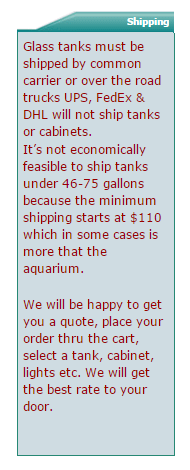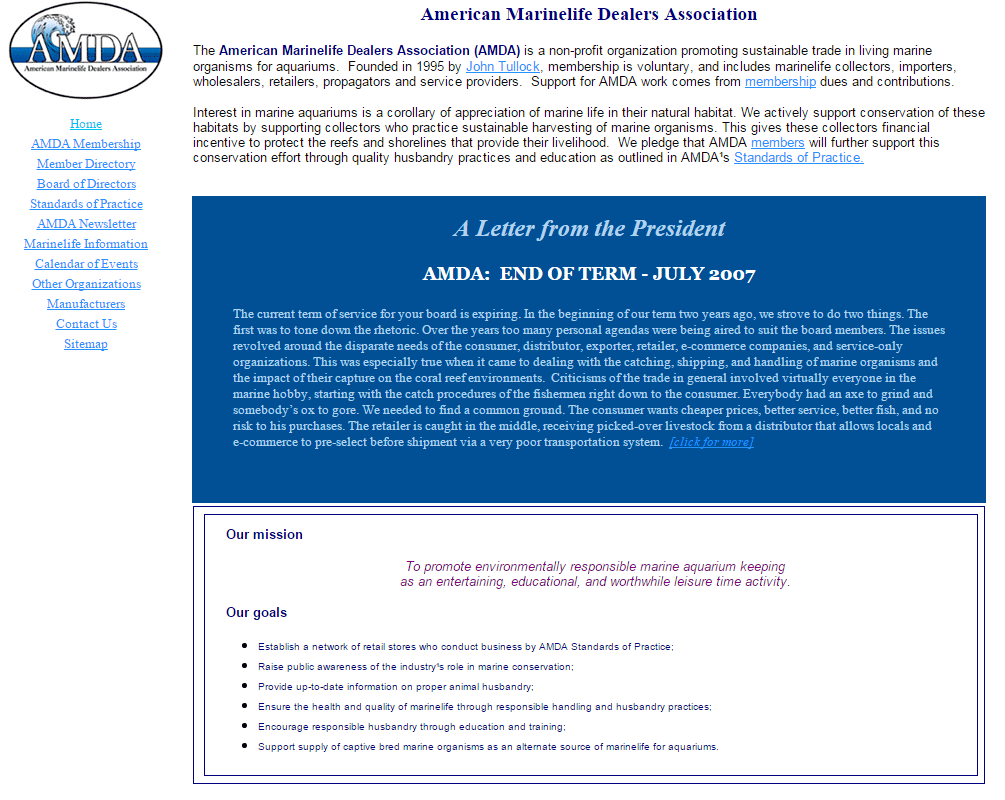Despite conditions in the economy, several of the dealers I’ve spoken with say they’re doing fine. Back in the good old days of the 90s, my store did all right during tough times, too. People kept coming in for food and supplies, even though they might not buy a new fish or splurge on a bigger setup. Vance Peters, owner of Vance’s Tropical Fish in Bucksport, ME, offered up a theory when we spoke recently. Vance suggested that when people are stressed out they turn to their hobbies for relaxation. He says he’s had a surge in business during the past few months.
Nobody denies that it’s relaxing to watch your aquarium, so Vance may be on to something. Other sources seem to bear him out. For example, in a recent email newsletter Ralph Cabage, owner of Aquarium Life Support Systems, a wholesaler in Knoxville, TN, reports that his sales were up in 2008, noting that such results are “No small feat in this environment.” Agreed.
And consider this observation from a CNN report on the consumer electronics show:
Many Americans are struggling to pay bills, find jobs and even avoid foreclosure, so it may seem like an extravagance to spend hundreds of dollars on a laptop or a digital camera. But financial fears also are leading folks to stay home. Electronics industry observers think this nesting trend could increase demand for Blu-ray players, stereos and video games.
Nesting Trends
Surely the “nesting trend” also applies to aquarium enthusiasts. This post from Pet Product News bears out that hypothesis. (Scroll down to the graphic at the bottom of the page.) [Update 6/1/2015: the PDF is no longer available on the Pet Product News website as originally linked, but we’ve archived a copy here as a PDF]
One would also expect, though I have no data to support the contention, that the large discount online dealers would be doing well, as hobbyists seek to reduce their costs by any means possible.
Despite these good news reports, however, I wonder how many dealers are having a hard time staying open. One local store closed this summer even before its doors were open to the public. If I had to guess, I would say credit issues were to blame. Small retailers must typically rely on bank credit to manage their cash flow.
Rumor has it another local shop is going down, as well. I hope they survive, though, because local competition is good for both hobbyists and the dealers themselves. Competition generates greater interest in the hobby, exposing more people to the delights of aquarium keeping. When an area has many shops, it also has many hobbyists, and usually a fish club or two. Twenty years ago, when I opened Aquatic Specialists, there were seven aquarium stores within half an hour’s drive of downtown. Today, there are only three, one of which may not survive. We do have full line pet stores that also carry fish alongside dogs, cats, birds, etc., but I am talking about successful aquarium-only shops. How did we get to this point?
Assigning Blame
No doubt, a combination of factors is to blame. Economic hardship certainly cannot be ruled out. Lord knows, almost everyone has taken some kind of hit, on investments, home values, maybe even their job. But the economic disaster is barely a year old, so we must look elsewhere to explain the overall decline.
One factor is the vastly increased availability of virtual pastimes, such as computer games, online social networking, and similar tech trends that compete for people’s leisure time and their disposable income. Email was almost unheard of, for example, when my store opened in 1987, and data transfer rates were measured in bits per second, not mega-bits per second.
Another technology-related issue is the improvement in air transport. This has been a double-edged sword for aquarium businesses. On the one hand, it has led to greater availability of fish and invertebrates from far-flung corners of the planet. On the other hand, when people can so easily visit a tropical reef or rainforest, they may not have so great a desire to keep denizens of these habitats at home. Why settle for the faux reef, when a real one is as close as your credit card?
Many independent retailers see e-commerce and large discounters as the major threat to their survival. About eighteen months ago, then-president Burton Patrick posted a letter on the AMDA web site that leaves no doubt about his position on this issue. [UPDATE 6/1/2015: the AMDA website is no longer online, but a copy of Burton Patrick’s letter was saved via Archive.org and is now archived here as a PDF] (Full disclosure: I founded AMDA in 1995, but have not been an active participant since I sold my interest in Aquatic Specialists a couple of years later.)
I agree with Patrick that the brick and mortar retailer often finds himself outdone on many fronts by the bigger concerns. Cabage’s newsletter cites many of the same problems that Patrick enumerates.
Regardless of where we assign blame, the bottom line is that we have fewer local shops and fewer people entering the aquarium hobby. What can we do to stop the downward trend and hopefully reverse it?
Buy Local
Support your local dealer. I’ve heard and read plenty of hobbyists’ complaints about plenty of dealers. Nevertheless, we must recognize that local retail shops are the primary source of recruitment for new hobbyists. They also sell the majority of aquarium tanks.

Screenshot of example shipping charges, via Archive.org, May 10th, 2008 snapshot.
Shipping costs, according to one online dealer site, will add a minimum of $100-plus to the cost of a glass tank.
Acrylic tanks are less costly to ship, but nevertheless the additional expense is anything but negligible. As a rule, direct shipping is practical only for really large tanks, or nano-reef sizes. Neither of these is particularly appropriate for a beginner.
That leaves the local shop as the best source for a tank in the 20 to 40 gallon range that most people will want for a first aquarium. Unfortunately, shops cannot make enough money on these sales alone to remain in business. They need repeat sales of food and supplies, products that these days a great many people buy online.
Changing this situation is a tough nut to crack, but it will have to happen or the entire industry can collapse. When the number of aquarium hobbyists falls below a critical point, even the biggest online stores will have to look elsewhere for revenues.
How can we save our hobby and keep prices reasonable, too? I certainly do not have the answer, but I am willing to bet there is a way.
I would love to hear your thoughts on the subject.






